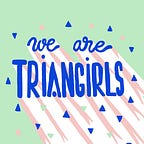Introducing Alex Moore
Triangirls Spotlight Series
What is your role and current job?
Senior Frontend Developer at Kurt Geiger
How did you get into tech?
Around 7 years ago I attended a hackathon for young people named ‘Young Rewired State’. I was in complete awe of these incredible people and what they could create with code. This really lit a fire under my belly and I thought ‘If these young people can do such amazing things, why can’t I?’. It was then that I decided that this is what I want to do, so I started to teach myself to code alongside working full time in retail.
I found it amazing what I could create by just writing lines of code and the amount of free resources out there to help teach you how to learn to code was brilliant. Although it was quite difficult not having a set path to follow or anybody to ask for help. I began my learning on Codeacademy (back when it was just starting out and was free) which was a great place to start learning the fundamentals of frontend code. But I found it rather difficult bridging the gap between completing small exercises on there and bringing it out to start a project of my own. The more I persevered and smashed through those brick walls that I was hitting, the more I learned.
What have the biggest challenges been as a woman or non-binary person in tech?
I feel like the biggest challenge in my career so far has been imposter syndrome.
Have you overcome any of these issues? If so, how?
I feel like I’ll always experience waves of it throughout my career, so I’m not sure I’ll ever overcome it, just learn how to deal with it better. It is surprisingly a very common issue within the industry, yet I feel it is not talked about enough. To attempt to combat the issue I try to give positive feedback to others around me when I can.
What advice would you give others in a similar position?
If I feel like a problem is too overwhelming for me to solve, it really helps to break it down into smaller, more manageable chunks that can be accomplished step-by-step, rather than trying to solve everything at once. I’d also say to try to believe in yourself. It’s a great exercise to look at the code you wrote a while ago and see how far you’ve come.
Are there any resources you recommend sharing?
Honestly, I’d recommend Twitter as a fantastic resource for those learning to code or in the industry already. I have found a lot of great meetups on the platform (like Triangirls!) and also there are wonderful accounts I follow to stay up to date with the latest trends and technologies.
Also for those learning to code, there are some wonderful free initiatives that can give you a more structured learning plan and somebody to ask for help if you need it. If you are also going down the self-taught route, Codebar has chapters all across the country and the world and is running virtual workshops at the moment. The organisers of the workshop pair you with a mentor and you can either work through the tutorials they provide in the language you choose, or you can work through a personal project together. Alternatively, Code First Girls run 8-week courses at Universities around the countries to introduce you to the fundamentals of development. I led one of these at the University of East Anglia and it was incredible to see what the students could create in such a short period of time.
When did you first hear about Triangirls?
I initially saw one of their events advertised on Twitter. I have since attended a few Triangirls events and love how much of a welcoming and inclusive community it is.
What have you learnt about yourself in the past year?
In the past year, I have realised how much I enjoy in-person events and meetups.
I have also re-ignited my love for sewing and cooking (in an attempt to get away from a screen for a few hours a day) which has been really nice.
Triangirls are looking to raise the profiles of women and non-binary people in tech. Interested in participating in our spotlight series? Email us at hello@triangirls.com
